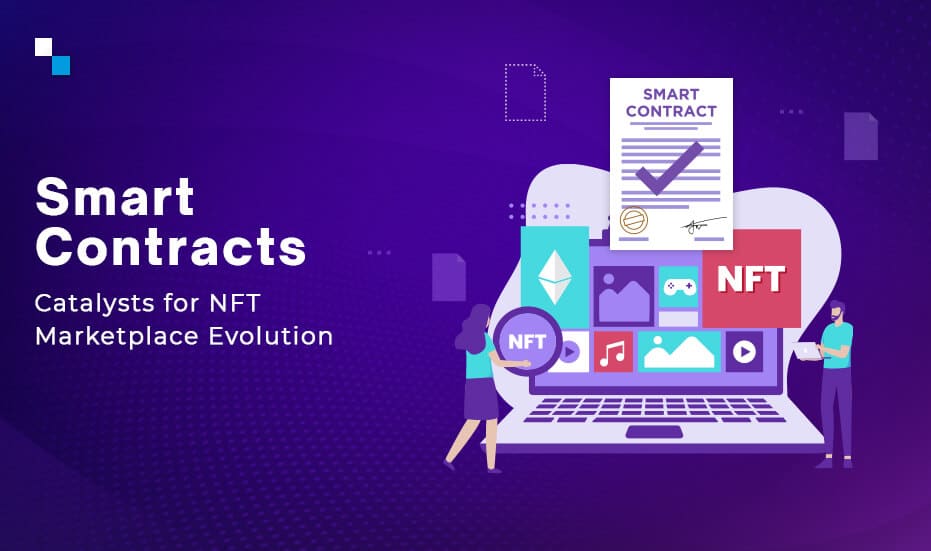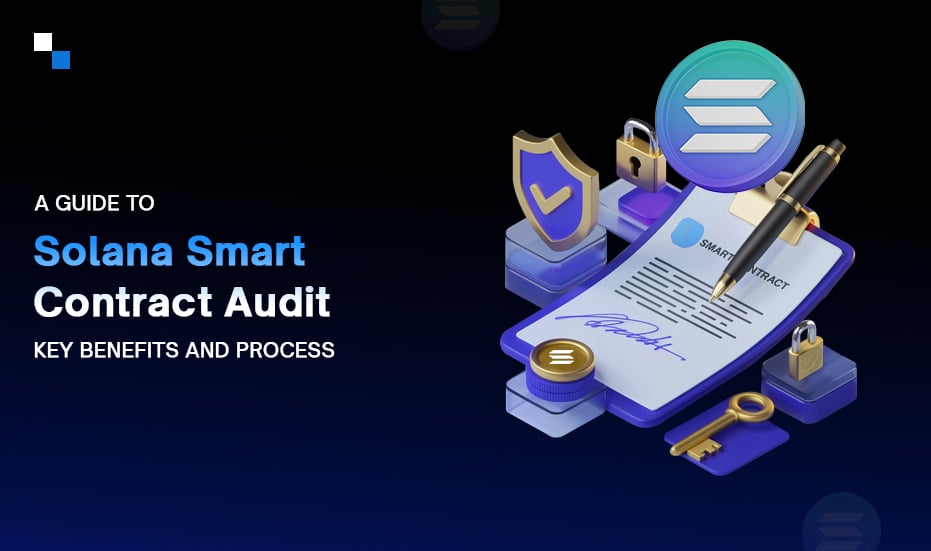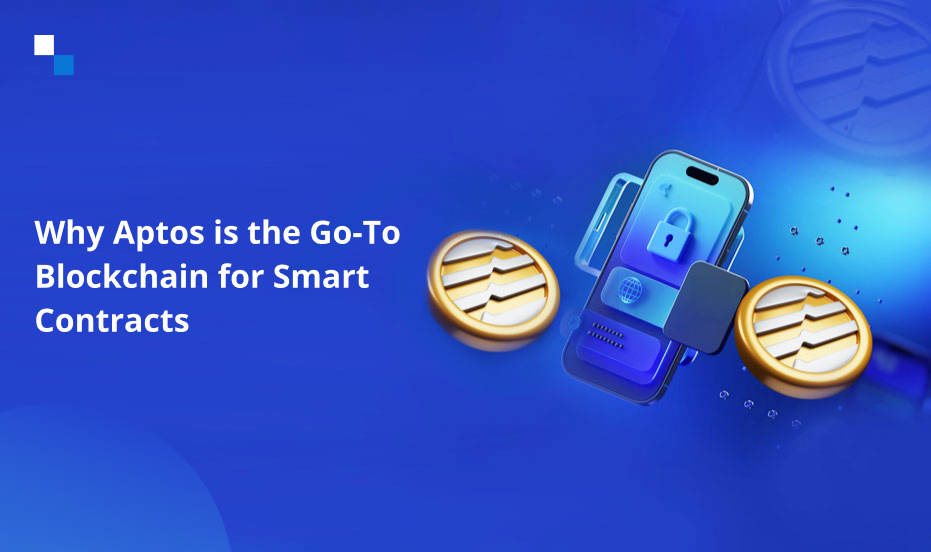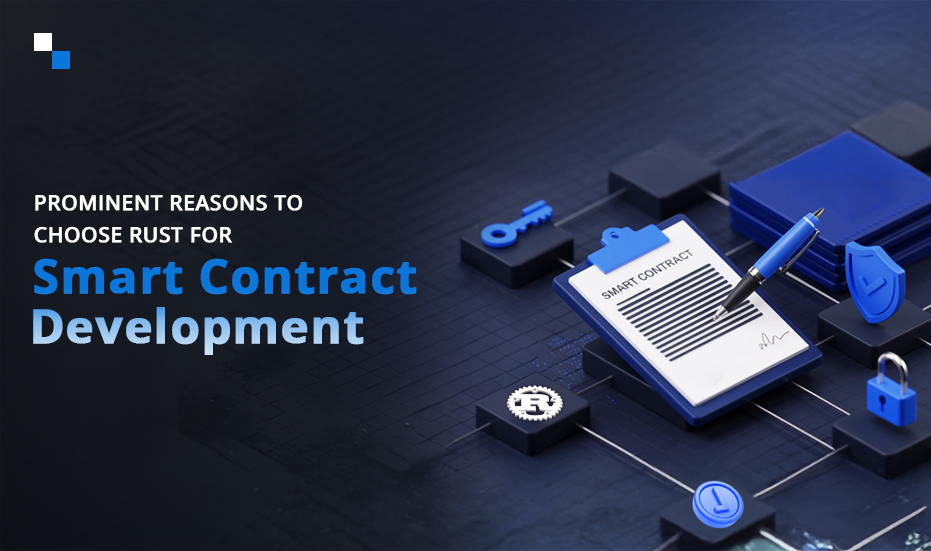
White Label NFT Marketplace Platform- The Significance of Infusing Smart Contracts
September 26, 2023
Next-Gen Mobile Crypto Wallet Development Solutions: AI and Automation Redefined
September 26, 2023Have you ever thought about the driving force behind the smooth sailing of NFT marketplaces? Well, there is not a big secret. Integrating smart contracts into NFTs is of great importance to ensure the growth and sustainability of NFT’s ecosystem. These self-executable contracts automate ownership verification and ensure authenticity and provenance.
Smart contract development is helpful in enabling a transparent and tamper-proof transaction payment system. It benefits the NFT creators as they get automated royalty payments, effortlessly. All records of financial activities are stored on the blockchain ledger. Wouldn’t you like to experience such a facility and also like the others to be a part of it? You can do it by building an NFT marketplace.
However, if you are about to initiate a marketplace, you must ensure that the smart contract development services you are going to choose are capable of enabling decentralized, peer-to-peer trading, as it will be helpful in eliminating intermediaries and reducing fees. Conditional transactions enhance NFT utility and allows assets to respond to specific conditions. In addition to this, smart contracts enable fractional ownership, and increases the accessibility of high-value assets to a greater number of investors. No wonder, partnering with a smart contract development company having in-depth knowledge of how NFT marketplaces functions will make it easier to ensure trust & security, and unfold a world of creative possibilities.
Understanding the World of NFTs- How Marketplaces Work?
Non-Fungible Tokens (NFTs) have taken the digital world by storm, as they have completely transformed the way we own and trade unique digital assets. NFT marketplaces serve as the digital venues where NFT creators, collectors, and crypto enthusiasts perform various activities like listing, selling, and buying these one-of-a-kind tokens.
Smart contract development simplifies and secures various crucial steps within NFT marketplaces: Here’s how smart contracts empower NFT marketplaces:
1. Minting NFTs
- Process: Creators mint NFTs. They create a unique token with metadata that mentions asset’s title, description, and the details about the creator.
- Smart Contract Role: Smart contracts automate the minting process, and the blockchain technology helps to maintain the transparent and tamper-proof record of the NFT’s existence and ownership.
2. Listing NFTs for Sale
- Process: NFT owners list their tokens for sale. They specify the price, auction parameters, or reserve price.
- Smart Contract Role: Smart contracts help to manage the listing process by enforcing predefined rules, for example, auction duration or minimum bid increments.
3. Provenance and Ownership Verification
- Process: NFT marketplaces enable the users to view transparent histories of each NFT, which includes the name of previous owners and transaction details.
- Smart Contract Role: Smart contracts store the complete, immutable provenance of NFTs on the blockchain. It helps to ensure trust and authenticity.
4. Buying and Selling NFTs
- Process: Buyers place bids or purchase NFTs directly. It triggers transactions between the two parties.
- Smart Contract Role: Smart contracts execute transactions automatically as soon as the predefined conditions are met successfully. It includes confirmation of payment, ownership verification, and transfer of NFT to the buyer. The smart contract development services are aware of setting such parameters for smart contract execution.
5. Automated Royalties:
- Process: Creators often receive royalties on secondary sales of their NFTs.
- Smart Contract Role: Smart contracts automate royalty distribution. It ensures that the NFT creators will receive a predefined percentage of each resale.

6. Decentralized Trading:
- Process: NFTs can be traded directly between users without the need for intermediaries.
- Smart Contract Role: Smart contracts facilitate peer-to-peer trading, and ensure secure, transparent, and efficient transactions.
7. Conditional Transactions
- Process: NFT smart contracts can facilitate conditional transactions. For example, an NFT representing a concert ticket can grant access to an event only if certain conditions are met, such as the event date and location.
- Smart Contract Role: Conditional transactions in NFTs involve actions based on predefined conditions. Smart contracts play a pivotal role in this process by automating the execution of these conditions.
8. Fractional Ownership
- Process: Fractional ownership of NFTs allows the owner to divide a unique digital asset into smaller, tradable shares. Investors can buy and trade these fractions, allowing wider access to high-value assets.
- Smart Contract Role: Smart contracts play a crucial role by creating and managing these shares on the blockchain. These contracts automate ownership verification and makes sure that rights and profits of shareholders are proportionally distributed.
9. Cross-Platform Interoperability
- Process: NFT smart contracts can be programmed in a way that they may interact with other blockchain platforms and decentralized applications (DApps).
- Smart Contract Role: Smart contracts act as bridges and facilitates interactions between different blockchain ecosystems. These contracts ensure that NFTs originating on one platform can be securely and transparently utilized, traded, or integrated into applications on other blockchains. It expands the versatility and utility of NFTs across different digital landscapes.
10. Trustless Escrow Services
- Process: When a buyer initiates a purchase of an NFT, the smart contract holds both the NFT and payment in escrow.
- Smart Contract Role: Smart contracts acts as escrow services. Once predefined conditions, like payment confirmation or asset delivery, are met, the contract automatically releases the NFT to the buyer and the payment to the seller.
11. Tokenization of Physical Assets
- Process: Tokenization of physical assets involves the conversion of real-world assets, such as real estate or art, into digital tokens on a blockchain.
- Smart Contract Role: Smart contracts play a pivotal role in making it successful by ensuring the secure and transparent creation, transfer, and management of these tokens. By Choosing the right smart contract development services, the marketplace can automate ownership verification, fractional ownership, and conditional transfers, which simplifies the trading of physical assets.
When choosing a smart contract development company, you must ensure that the professionals have a deep understanding of how NFT marketplaces rely on smart contracts to automate and secure critical aspects of NFT lifecycle management.
Wrapping Up
The fusion of NFTs and smart contracts has ushered in a new era of digital ownership and creativity. An NFT marketplace provides a platform for creating and trading digital assets, and they cannot function properly in the absence of smart contracts.
It’s an undeniable fact that smart contracts stand as the bedrock of secure, transparent, and efficient transactions. They help simplify various processes associated with NFT marketplaces, including minting, sale, purchase, and trading. Smart contract development services help ensure trust and empower creators and collectors alike.
Antier, a seasoned smart contract development company, has deep expertise in blockchain technology and NFT marketplace development. Our team contributes to the seamless functioning of NFT marketplaces by leveraging the power of smart contracts. We foster innovation, and we would like to join the journey of your success. Let’s talk!



